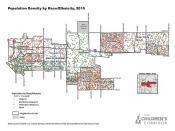Evolution is an unpredictable and natural process of temporal descent with genetic modifications that is affected by natural selection, chance, and changing environments. An easier more simplified definition is a change in the gene pool of a population over time. A gene is a hereditary trait that can be passed on for many generations.
The gene pool is the set of all genes in a species or population. In order to understand evolution, it is vital to view populations as a collection of individuals, each harboring a different set of traits. A single organism isn't expected of a whole population unless there is no variation in that population. Individual organisms do not evolve; they keep the same genes throughout their life. When a population is evolving, the setup of different genetic types is changing. Each single organism within a population does not change. The process of evolution can be summarized in three simple steps: genes mutate, individuals are selected, and populations evolve.
Evolution can be divided into microevolution and macroevolution. The kind of evolution listed above is microevolution. Greater changes, like when a new species is created, are called macroevolution. Some biologists think that the workings of macroevolution are different than the ones of microevolutionary change. Other people believe that the distinction between the two is irrational, macroevolution is cumulative microevolution.
The word evolution has a variety of meanings. The fact that all organisms are related by descent to a common ancestor is usually called evolution. The argument of how the first living organisms came about is usually called evolution. This should be called abiogenesis. Very commonly, people use the word evolution when they really mean natural selection (one of the many workings of evolution.)


